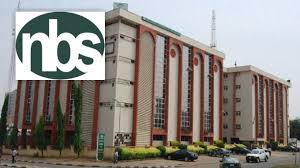Nigeria’s headline inflation rate eased to 22.22 per cent in June 2025, according to the Consumer Price Index (CPI) and Inflation Report released on Wednesday by the National Bureau of Statistics (NBS).
The report indicated a 0.76 percentage point decline from the 22.97 per cent recorded in May 2025.
On a month-on-month basis, the headline inflation rate in June stood at 1.68 per cent, slightly higher than the 1.53 per cent recorded in May, signalling a quicker rate of price increases within the month.
“This means that in June 2025, the rate of increase in the average price level was higher than that in May 2025,” the report stated.
The main contributors to the year-on-year headline inflation were Food and Non-Alcoholic Beverages (8.89 per cent), Restaurants and Accommodation Services (2.87 per cent), and Transport (2.37 per cent).
Recreation, Sport and Culture (0.07 per cent), Alcoholic Beverages, Tobacco and Narcotics (0.08 per cent), and Insurance and Financial Services (0.10 per cent) were the least contributors.
Year-on-year food inflation stood at 21.97 per cent in June 2025, down from 40.87 per cent in June 2024—an 18.90 percentage point drop, which the report attributed to a change in the base year.
Month-on-month food inflation rose to 3.25 per cent in June from 2.19 per cent in May, driven by price increases in items such as dried green peas, fresh pepper, dried shrimps, crayfish, fresh meat, fresh tomatoes, plantain flour, and ground pepper.
Core inflation, which excludes farm produce and energy, stood at 22.76 per cent year-on-year in June. On a month-on-month basis, core inflation rose to 2.46 per cent in June from 1.10 per cent in May.
The report also included newly introduced sub-indices. On a month-on-month basis, Farm Produce and Goods recorded -13.3 per cent and 0.93 per cent respectively, compared to May’s 22.38 per cent and 9.39 per cent. Services and Energy were 3.26 per cent and -11.0 per cent, respectively, compared to 1.79 per cent and -0.43 per cent in May.
Urban inflation stood at 22.72 per cent year-on-year in June, with a month-on-month increase of 2.11 per cent, up by 0.71 percentage points from May’s 1.40 per cent.
Rural inflation was 20.85 per cent year-on-year. Month-on-month, it dropped to 0.63 per cent in June, down from 1.83 per cent in May.
In state-level analysis, Borno recorded the highest all-items year-on-year inflation rate at 31.63 per cent, followed by Abuja (26.79 per cent) and Delta (25.91 per cent). Zamfara had the slowest rise at 9.90 per cent, followed by Yobe (13.51 per cent) and Sokoto (15.78 per cent).
Month-on-month, inflation was highest in Ekiti (5.39 per cent), Delta (5.15 per cent), and Lagos (5.13 per cent), while Zamfara (-6.89 per cent), Niger (-5.53 per cent), and Plateau (-4.01 per cent) recorded the lowest.
For food inflation year-on-year, Borno topped with 47.40 per cent, followed by Ebonyi (30.62 per cent) and Bayelsa (28.64 per cent). Katsina (6.21 per cent), Adamawa (10.90 per cent), and Sokoto (15.25 per cent) had the lowest figures.
Month-on-month food inflation was highest in Enugu (11.90 per cent), Kwara (9.97 per cent), and Rivers (9.88 per cent), while Borno (-7.63 per cent), Sokoto (-6.43 per cent), and Bayelsa (-6.34 per cent) recorded the slowest rise.
The report stated that the CPI rose to 123.4 in June 2025, reflecting a two-point increase following the recent rebasing of the index.
The NBS had earlier rebased the CPI, updating the base year from 2009 to 2024, with 2023 as the reference year for expenditure weights.
Statistician-General of the Federation, Adeyemi Adeniran, said the rebasing aimed to align economic indicators more closely with current economic realities by incorporating new sectors, updating consumption patterns, and refining data collection methods.
(NAN)


